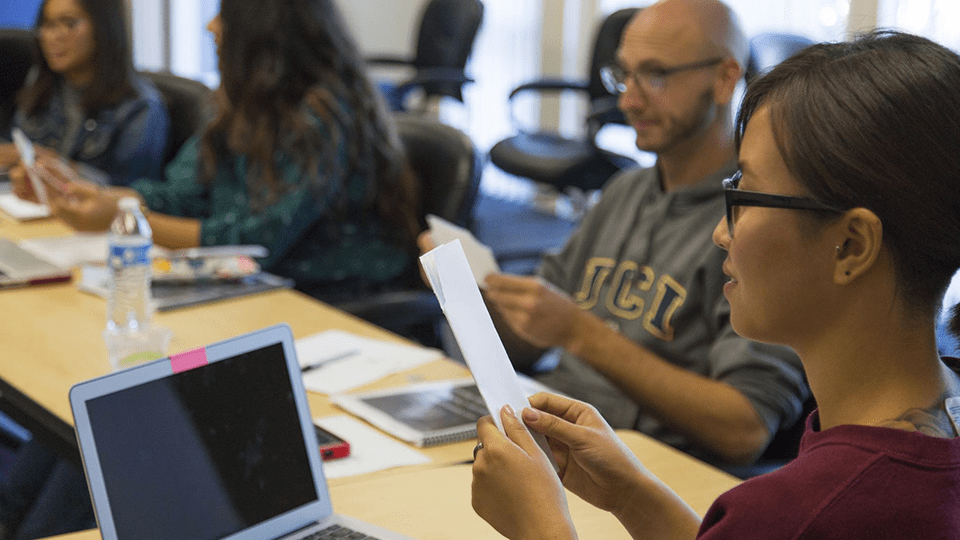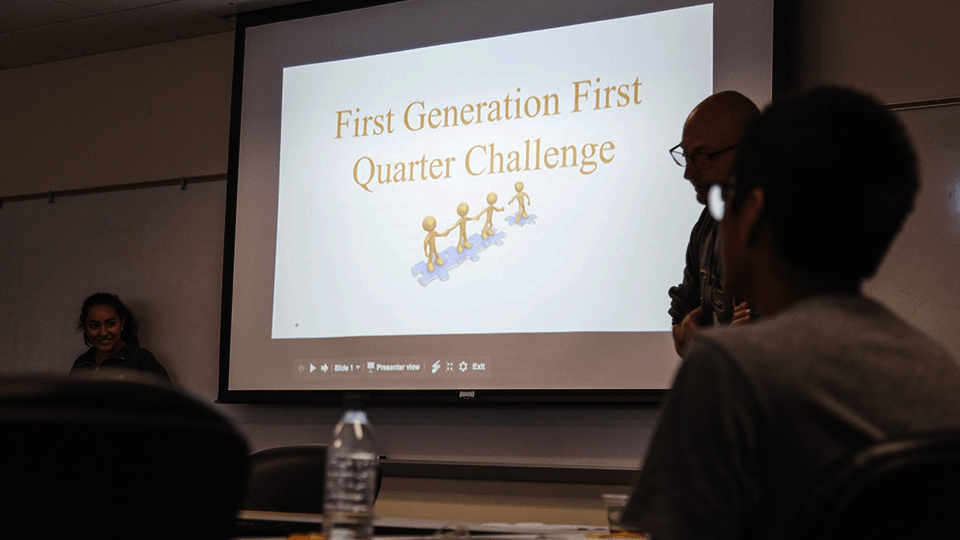
It’s going to be providing a service for the new majority, for a community that is growing and very real. –Monica Rodriguez
The traditional definition of student includes that one’s parents went to college. In fact, more than half UCI’s undergrad is composed of students whose parents did not attend college, but college is built around the idea that our students are continuing ed students. –Harwood Glen
It advocates for the needs of first gen students. They need services and resources, and the program was also built for them by first gen students. We know their struggles, so we created workshops to attend to their needs –Ester Kim
The First Gen Quarter Challenge is a program created by first generation students for first generation students in the School of Social Sciences. A group of dedicated leaders have spent a year planning and refining this program to help support incoming first generation freshmen. The 10-week program, run by peer mentors, features specially tailored workshops, informative Q&A sessions, and the opportunity to connect with and be supported by other first generation students. Helary Yakub(3rd year undergrad, Psychology & Social Policy and Public Service), a mentor for the program, emphasizes that it’s important for first generation students to know that they “have a support system that’s trying to help.”
The program will be launched by the School of Social Sciences in the Fall Quarter of 2016. The initiative was started by Anita Casavantes Bradford, Associate Professor of Chicano/Latino Studies, who was also a first generation college student. The program’s Co-Director, Davin Phoenix, is an Assistant Professor of Political Science. Their shared passion for helping first generation students fueled the start of the program, and the student passion for helping first generation students helped make the program a reality.
The First Gen Quarter Challenge aims to prepare first generation students for the transition into life at a university. The program currently targets students in the Social Sciences, but the team hopes to expand it to other departments on campus.
Nearly 60% of undergraduates students at the University of California, Irvine are first generation students. One of the program’s mentors, Harwood Garland (1st year grad, Medicine, Science, and Technology Studies), notes that undergraduate education seems to be tailored towards students whose parents have attended college as opposed to first generation students, who are now the actual majority of the undergraduate population.
These first generation, undergraduate students come in with very little knowledge of the academic and social expectations of higher education. Another mentor, Julian Bugarin (4th year undergrad, Political Science), also notes that it’s “important to restructure what people think of first gen students. People use that term interchangeably with poor or minority. That’s not what it is, There’s more than just that demographic.”
Through making first generation students both visible and aware, the program will prepare first generation students for the intricacies of higher education as well as dispel stereotypes about what being a first generation student means. While the program seeks to advocate for both low-income students and students of color within the first gen demographic, it also recognizes that first generation students come from all racial and socioeconomic backgrounds and works to build bridges around their shared experience of being “first in the family” to go to college.
From the experiences of the first generation mentors, these stories reveal how much of a positive impact the program will have on incoming, first generation students:
Describe Your Experience as a First Generation Student:
Really tough. I didn’t know how to navigate higher education or how to build social connections. I didn’t have anyone to guide me through it. My parents couldn’t help because they didn’t know how the system worked. Going through every step on my own was really scary. I wish I had this program when I came to UCI to really grasp what my role as student was. –Ester Kim
My high school didn’t really prepare me academically for college. Coming to UCI was really overwhelming. I thought would be a lot easier when I came in. I struggled. Eventually, I did feel like I could reach out to other people, but I feel like it would’ve been better if I had the resources to reach out a lot earlier. –Shannen Dilag
My sister and I are both first generation students. She went through a lot of the same things that I did which made me realize that I’m fortunate to at least have someone who knows a little about the system, but she didn’t necessarily teach me everything because she didn’t know everything. I’m just fortunate that I fell in with the right people, and I hope that I can help incoming students the way that I was helped. I was lucky. –Freddy Cruz
It was very tough in the beginning getting used to the new setting, transitioning from high school, moving away from home, and understanding that university has different, much higher expectations. I was fortunate enough to meet Professor Bradford and Professor Enriquez who have guided me through my last 3 years in my undergrad. –Daisy Vera
When it was combined with undocumented status, it was difficult. I didn’t know I had to take SATs or how to navigate the finaid process, so all of these things piled up, and I had no idea how to deal with them. I didn’t have mentors in high school because no one knew how to help undocumented students in higher education. It was a process that I had to learn on my own completely, Once I got here, there wasn’t a resource that helped me with the intersectionality of being first gen and undocumented. –Yareli Castro
The program begins in Fall Quarter of 2016. Incoming, first generation freshmen and transfer students in the School of Social Sciences are encouraged to apply. The program is free, but space is limited.

